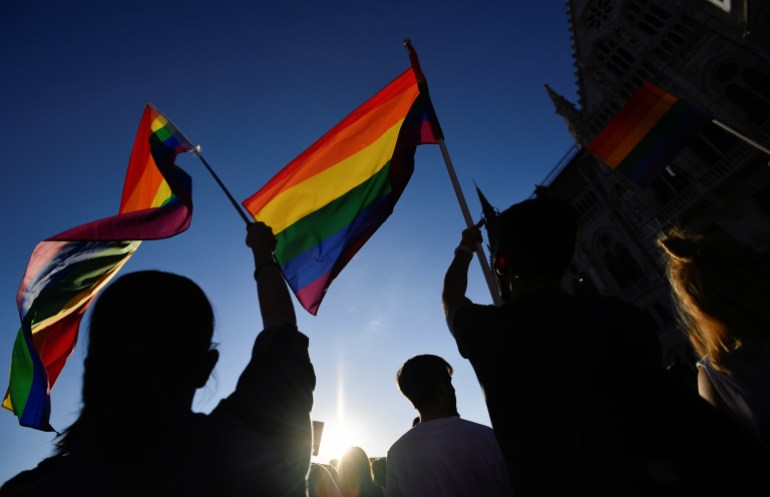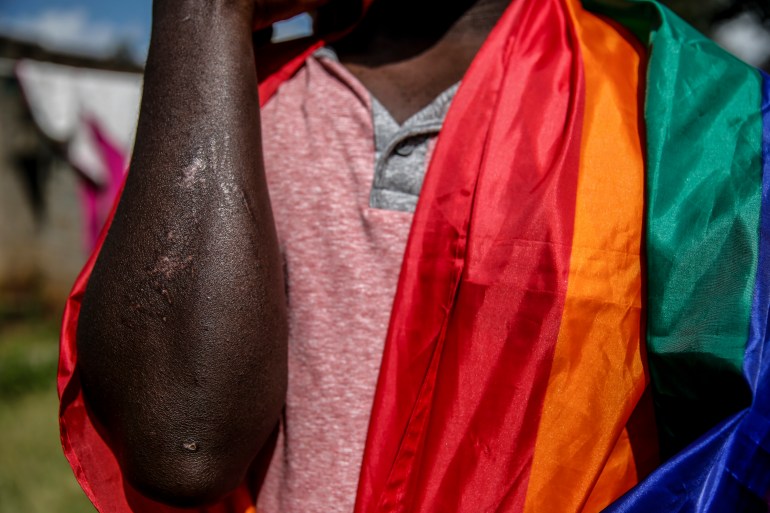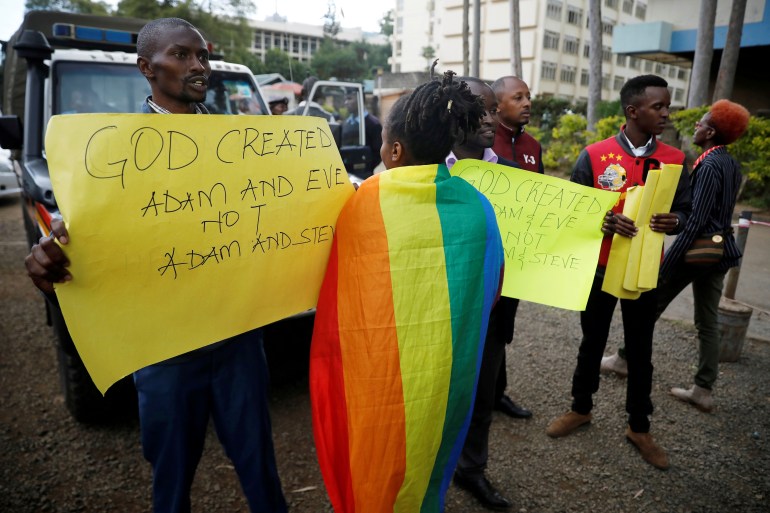Counting the economic cost of anti-LGBTQ laws
Studies suggest countries that are more inclusive of LGBTQ people have stronger economies and more productive workers.

While on a trip to the United States in 2018, Rikki Nathanson learned secret police were looking for her at her home and office in Zimbabwe. It was then the prominent transgender activist knew she couldn’t go back.
More than four years earlier Nathanson was arrested by Zimbabwean police at gunpoint for using a women’s bathroom. She was forced to remove all her clothing to “verify her gender”, thrown in jail and repeatedly beaten, she told Al Jazeera. But when a magistrate judge asked the prosecutor how Nathanson had created a “public nuisance” – the charge she faced – the case was dismissed.
Keep reading
list of 4 items‘No good evidence’ for gender care for youth over long-term, review finds
Vatican denounces gender-affirming surgery, gender theory and surrogacy
Fears of discrimination in Thailand despite looming same sex marriage bill
“The arrest and the events after it were extremely traumatic, degrading and humiliating,” Nathanson said.
Later that year, she filed a lawsuit against the Zimbabwean government over her arrest. But her horrifying experience continued in the months and years that followed. Someone repeatedly followed her, her phone was tapped and “thugs” twice broke into her home and beat her the second time, she said.
So, when she was in New York for OutRight Action International’s 2018 summit, she decided to seek asylum and give up her life back home.
It’s not a choice Nathanson made lightly. A successful trans activist in Zimbabwe, she’s well educated and an active member of society. But like many other members of LGBTQ communities in countries with repressive and often dangerous anti-LGBTQ laws, she knew her options were to face harassment and abuse there, hide her identity or flee.
Nathanson estimates that in recent years, thousands of LGBTQ people have left Zimbabwe, where sodomy is criminalised and there are no ways to change one’s gender on official documents. When they go, they often take with them skilled labour and money that would otherwise go into the Southern African nation’s struggling economy.
It’s an issue that rights groups and economists say governments and businesses would do well to consider as economies around the globe struggle to recover from the blow delivered by COVID-19 lockdowns and restrictions.
Some economists estimate countries are losing billions of dollars a year due to homophobia and exclusionary laws and practices.

The toll on economies
By limiting a person’s access to jobs, education and healthcare – and by erecting other barriers – anti-LGBTQ laws prevent people from fully participating in a nation’s economy. That means discriminatory legislation is a drag on economic growth, to the detriment of the entire nation.
Anti-LGBTQ laws and discrimination are estimated to cost economies as much as one percent of total economic output measured by annual gross domestic product (GDP), according to Lee Badgett, a professor of economics at the University of Massachusetts Amherst and a senior scholar at the Williams Institute.
A 2018 study co-authored Badgett examined economic data for more than 120 countries between 1990 and 2014. The study found that a $1,506 increase in GDP per capita was associated with a one-point increase for a country on the Global Acceptance Index, which uses public opinion polling to estimate the level of acceptance of LGBT people.
Using a different measurement in a 2019 study, Badgett and other researchers found that an extra point on the Global Index on Legal Recognition of Homosexual Orientation, which consists of eight categories of legal recognition and protection, was associated with an increase in real GDP per capita of about $2,000.
These and other studies use “different kinds of measurements [to] tell the same story … that economies are diminished by homophobia and transphobia,” said Badgett, who also wrote the book The Economic Case for LGBT Equality.
According to Human Rights Watch, at least 69 countries have national laws criminalising same-sex relations. Most of these countries are in Africa, the Middle East and the Caribbean. Nine countries have laws criminalising forms of gender expression.
In many countries, the economic impact from homophobia and transphobia starts at an early age, Badgett told Al Jazeera. Bullying in school due to social stigma and other factors leads to lower grades and higher dropout rates for LGBTQ people.
LGBTQ exclusion from society also affects people’s physical and mental health. Together this diminishes productivity and the skills needed to make economies thrive.
Countries that exclude LGBTQ people are taking away from what economists call “human capital”, Badgett said, adding that anti-LGBTQ laws and stigma “takes up energy [LGBTQ people] could otherwise use to participate in an economy”.

‘Good for business’
LGBTQ inclusion is not only good for governments and economies, say researchers, but it is also good for businesses.
This plays out on multiple levels, according to Jon Miller, partner at the Brunswick Group and founder of Open for Business, a coalition of companies advocating for LGBTQ equity.
For individuals, “performance is better in environments that are LGBT inclusive”, Miller told Al Jazeera. “You get more out of people. They’re more motivated [and] they bring their whole selves to work.”
Meanwhile, companies that are LGBTQ inclusive are “more innovative, more entrepreneurial, better able to collaborate across sectors, [and] better able to attract the most talented people and then retain those talented people”, Miller added.

In a 2019 report, Open for Business found that Kenya was losing an estimated $1.3bn a year due to LGBTQ discrimination.
While same-sex relations remain criminalised there, Miller said the debate in parts of Kenya after the report was published changed overnight.
“It went from a basic clash of moral systems to people going, ‘If we want to grow our tech cluster in Nairobi, if we want to raise levels of entrepreneurialism in the country, then are these repressive laws fit for purpose?'”
Even in countries reliant on extractive industries, such as mining, or oil and gas, there’s a strong business case for LGBTQ inclusion, Miller said.
Miller cites Gulf countries trying to diversify their economies away from fossil fuels as an example.
“They are all looking to build their industrial sectors that are high-value, creative-knowledge economies,” he said. These countries must therefore consider how to create “a culture that is entrepreneurial, that is creative and where there is an ecosystem of innovation so that kind of economic activity can start to flourish”, he said.
Better equipped to bounce back
Countries that are more inclusive are better placed to recover from the economic blow delivered by COVID-19, as well as future shocks, say researchers.
“You can never protect yourself completely from an economic shock, but what you can do is try to make sure that when that happens, you’re in a resilient position where the economy can rebalance fast”, Miller said. “Inclusive societies are much more able to find their feet and get back on a growth trajectory after a really negative economic event.”
The economic and business case for LGBTQ inclusion is clear, experts say, but ultimately more research needs to be done as many repressive countries lack solid data on LGBTQ communities.
For her part, Rikki Nathanson received asylum in the US in 2019. That same year, a court in Zimbabwe ruled in her favour in her wrongful arrest lawsuit, awarding her 400,000 Zimbabwean dollars (about $1,100 at the time).
She says it’s hard not being able to go back to her home country and visit her family and friends. But ultimately, she says, it’s Zimbabwe’s loss.